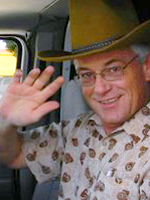By Leon Worden Wednesday, January 31, 1996
FRESNO — A weekend meeting in the San Joaquin Valley put me in touch with Ward Connerly, the University of California Regent who led the successful fight to eliminate racial preferences in public university admissions last year. Leon Worden is a Santa Clarita resident. His commentary appears Wednesdays.
To say that these past six months have been difficult for Connerly would be the understatement of the decade. Bullets have riddled the windows of his office. Students have marched in protest against him. He has been called everything from an "Uncle Tom" to a "sellout of his people."
Connerly posits: "Is there any difference between the white racists who called a young white boy a 'nigger lover' because he had befriended Ward Connerly in the '50s, and the black racists who call Ward Connerly an 'Oreo' because he holds firm in his belief that all people should be treated equally? By any other name, a racist is a racist is a racist."
Racists, heed this counsel: All the hate, all the cowardly terrorist acts in the world, whatever their source or cause, will not deter Ward Connerly from acting on his convictions. His very being exudes a resolve that you can practically reach out and touch.

"When we become citizens of this nation, at birth or otherwise, we get a warranty with our citizenship. We are guaranteed the right to vote, the right to due process, the right to be a free people and not to be held as slaves, and the right to equal treatment under the law, regardless of our race, color, national origin, sex or ethnic background.
"This warranty has not always been honored for some of us. Because of the color of our skin or the place from whence we came, some of us were denied the right to vote, we were enslaved, we were denied due process, and the equal treatment afforded to others was not ours to enjoy.
"But at the core of the American spirit is a sense of fair play. About 30 years ago, we embraced the concept of affirmative action to remedy the harm that had been done to black people."
What was intended to be a temporary solution to give blacks equal opportunity, Connerly says, has transformed into a system which applies different standards to different individuals in order to create parity between racial groups.
"At the University, and at other governmental institutions, what most Americans call discrimination, we call diversity. We think nothing of turning away thousands of white and Asian students every year from Berkeley and UCLA with 4.0 grade point averages, simply because they are Asian or white, in favor of under-represented races with 2.9 and 3.0 grade point averages.
"What we found morally wrong and defined as discrimination 30 years ago, we now simply ignore when it (impacts) white males or Asians or someone else whose group has more than its statistical share of the public pie."
"Yes, this issue is divisive. But the seeds of division are planted not by those of us who seek to eliminate racial and ethnic preferences, they are planted by those who believe that our skin color and gender and how we spell our last name should entitle us to the harvest of diversity — college admission, government employment and contracts."
We are at a crossroads in our evolution as a nation, Connerly says.
"We can continue perpetuating the outdated premise on which preferences are based: that blacks, women and other minorities are incapable of competing without a handicap. Or we can resume the journey to a fair and inclusive society in which all of us are free from the foul taste of race and its lingering effects.
"America's passion for fairness is not new-found. It is our passion for fairness that makes me a free man. It is our passion for fairness that said segregation based on racial or ethnic characteristics had to be ended. It is our passion for fairness that has contributed to America's tolerance of a system of racial preferences for decades as a means of compensating for past acts of unfairness.
"Let us not mourn the death of affirmative action. Instead, let us proclaim our belief that the spirit of equal opportunity, which affirmative action engendered, has become a permanent feature of America's social, economic and political landscape."
Would he lead this battle again, knowing of all the slings and arrows he has had to suffer?
"In a heartbeat."
Ward Connerly, chairman of the California Civil Rights Initiative, needs your help. More signatures are needed to qualify the measure for the November ballot, and very little time is left. If you haven't yet signed, call Hunt Braly at 287-3610.
©1996 LEON WORDEN — ALL RIGHTS RESERVED

